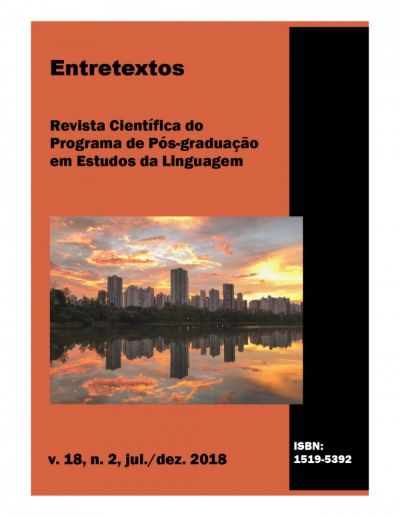Negociação de assuntos interculturais em espaços telecolaborativos
DOI:
https://doi.org/10.5433/1519-5392.2018v18n2p121Palavras-chave:
Telecolaboração, Interculturalidade, Ferramentas digitais.Resumo
O uso da Internet na área do ensino e aprendizagem de línguas destaca-se como objeto de estudos. No entanto, não há revisão de trabalhos sobre a negociação de significados em contextos telecolaborativos, possibilitados pelo uso da Internet. Essa constatação, assim como a relevância de revisões de literatura, nos ajudou a delinear o objetivo desse estudo, qual seja, compreender a relação entre o uso da telecolaboração e a negociação de assuntos interculturais por quatro trabalhos: Understanding the 'Other Side': Intercultural Learning in a Spanish-English E-mail Exchange (O'DOWD, 2003); The use of vídeo conferencing and e-mail as mediators of intercultural student ethnography (O'DOWD, 2006); Using e-learning to develop intercultural awareness in ELT: a critical evaluation in a Thai higher education setting (BAKER, 2012a); e Exploring 'new' interculturality online (DERVIN, 2014). A análise apontou que o contato entre culturas diferentes não garante o entendimento intercultural e que o conceito de cultura permanece associado com uma concepção essencialmente nacional.Downloads
Referências
BAKER, Will. From cultural awareness to intercultural awareness: culture in ELT. ELT Journal, London, v. 66, n. 1, p. 62-70, 2012a.
BAKER, Will. Using e-learning to develop intercultural awareness in ELT: a critical evaluation in a thai higher education setting. London, UK: British Council SW1A 2BN, 2012b.
BYRAM, Michael. Teaching and assessing intercultural communicative competence. Clevedon: Multilíngual Matters, 1997.
BYRAM, Michael; GRIBKOVA, Bella; STARKEY, Hugh. Developing the intercultural dimension in language teaching: a practical introduction for teachers. Strasbourg: Council of Europe Publishing, Language Policy Division, 2002. Disponível em: http://www.coe.int/t/dg4/linguistic/Source/Guide_dimintercult_EN.pdf. Acesso em: 14 maio 2016.
DERVIN, Fred. Exploring 'new' interculturality online. Language and Intercultural Communication, Helsinki, v. 4, n. 2, p. 191-206, 2014.
EWING, Katherine. The illusion of wholeness: culture, self, and the experience of inconsistency. Ethos, Washington, v. 18, n. 3, p. 251-278, 1990.
FANTINI, Alvino. Exploring and assessing intercultural competence. Federation EIL: Brattleboro, 2006.
FORNET-BETANCOURT, Raúl. La interculturalidad a prueba. Wissenschaftsverlag Mainz: Aachen, 2006.
KRAMSCH, Claire. Context and culture in language teaching. Oxford: Oxford University Press, 1993. KRAMSCH, Claire. Post 9/11: foreign languages between knowledge and power. Applied Linguistics, Oxford, v. 26, n. 4, p. 545-567, 2005.
LEVY, Michael. Computer-assisted language learning: context and conceptualization. Oxford: Claredon Press-Oxford University Press, 1997.
O'DOWD, Robert. Intercultural communicative competence through telecollaboration. In: JACKSON, Jane. The routledge handbook of language an intercultural communication. New York: Routledge, 2012. p. 342-358.
O'DOWD, Robert. Telecollaboration and CALL. In: THOMAS, Michael; REINDERS, Hayo; WARSCHAUER, Mark (ed.). Contemporary computer-assisted language learning. London: Bloomsbury, 2013.
O'DOWD, Robert. The use of videoconferencing and e-mail as mediators of intercultural student ethnography. In: BELZ, Julie; THORNE, Steven. (ed.). Internet-mediated intercultural foreign language education. Boston, MA: Heinle & Heinle, 2006. p. 86-120.
O'DOWD, Robert. Understanding "the other side": intercultural learning in a spanish-english e-mail exchange. Language Learning & Technology, Santa Barbara, CA, n. 7, p. 118-144, 2003.
RISAGER, Karen. Language and culture pedagogy: from a national to a transnational paradigm. Buffalo, NY: Multilingual Matters, 2007.
SAMOVAR, Larry; PORTER Richard; MCDANIEL, Edwin. Communication between cultures. Belmont, CA: Thomson, 2004.
SPITZBERG, Brian; CHANGNON, Gabrielle. Conceptualizing intercultural competence. In: DEARDORFF, Darla. The sage handbook of intercultural competence. Los Angeles: Sage Publications, 2009. p. 2-52.
THORNE, Steven. Pedagogical and praxiological lessons from internet-mediated intercultural foreign language education research. In: BELZ, Julie; THORNE, Steven (ed.). Internet-mediated intercultural foreign language education. Boston, MA: Heinle & Heinle, 2006. p. 2-30.
ZIENKOWSKI, Jan; ÖSTMAN, Jan-Ola; VERSCHUEREN, Jef (ed.). Discursive pragmatics. Amsterdam: Benjamins, 2011.
Downloads
Publicado
Como Citar
Edição
Seção
Licença
Copyright (c) 2018 Entretextos

Este trabalho está licenciado sob uma licença Creative Commons Attribution 4.0 International License.
Entretextos adota a Licença Creative Commons Attribution 4.0 International, portanto, os direitos autorais relativos aos artigos publicados são do/s autor/es.
Sob essa licença é possível: Compartilhar - copiar e redistribuir o material em qualquer suporte ou formato. Adaptar - remixar, transformar, e criar a partir do material, atribuindo o devido crédito e prover um link para a licença e indicar se mudanças foram feitas.























